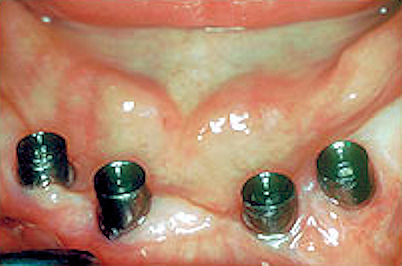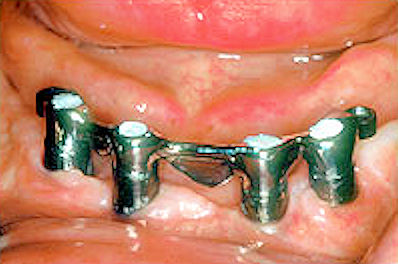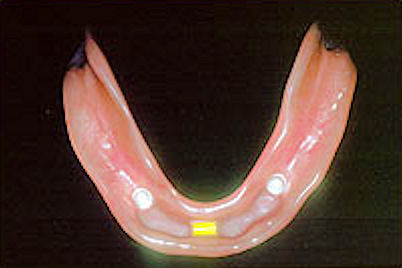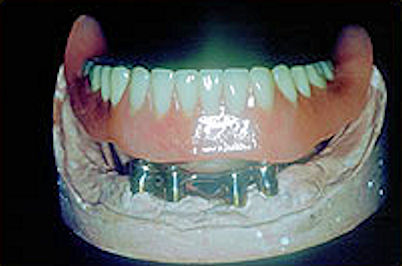New Patients are always welcome
An implant-supported denture is a type of overdenture that is supported by and attached to implants. A regular denture rests on the gums, and is not supported by implants.
An implant-supported denture is used when a person doesn't have any teeth in the jaw, but has enough bone in the jaw to support implants. An implant-supported denture has special attachments that snap onto attachments on the implants.
Implant-supported dentures are ideal for the lower jaw because regular dentures tend to be less stable there. Usually, a regular denture made to fit an upper jaw is quite stable on its own and doesn't need the extra support offered by implants. However, you can receive an implant-supported denture in either the upper or lower jaw.
You should remove an implant-supported denture daily to clean the denture and gum area. Just as with regular dentures, you should not sleep with the implant-supported dentures at night. Some people prefer to have fixed dentures in their mouths that cannot be removed, without an appointment with your denturist/dentist.
There are several types of implants and implant systems which can be used to secure dentures. Several of these systems provide "snap-in" denture stabilization so that your dentures stay in place, yet can still be removed for cleaning and care. These tend to be more affordable than non-removable options, and are ideal for many denture patients.
There are other implant-supported systems that are more permanent in nature (not removable by the patient), which provide additional support and natural-tooth functionality. Solutions range from fixed screw-retained denture systems to higher-end screw-retained zirconia tooth replacements.
One type of implant-supported dentures: bar-retained and another type is ball-retained. In both cases, the denture will be made of an acrylic base that will look like gums. Porcelain or acrylic teeth that look like natural teeth are attached to the base. Both types of dentures need a minimum of two implants for the lower and 4 for the upper.
The time frame to complete the implant depends on many factors. The shortest time frame is about five months in the lower jaw and seven months in the upper jaw. This includes surgery and the time needed for the bone to integrate with the implants.
In the first step one places the implants in the jawbone under your gums. The second step the tops of the implants are exposed. The next procedure comes three to six months after the first.
In the case of a full mouth extraction it is best to have a temporary denture for the healing period, until the implant-supported denture is placed, this way you can continue to function in your everyday life while your bone integrates to your implants It will take about four visits, spanning 4-5 weeks, to complete this denture. By making this temporary denture, we will be able to determine the best position for the teeth in the final denture. The temporary denture also can be used as a backup if something happens to the final implant-supported denture.

Standard abutments connected to the tops of the implants
At this point, the metal bar is placed on the abutments. You will have the first try-in of your new denture framework to see if it fits properly.

Bar secured to abutment with screws

Inside the denture showing the attachments or clips
Once the metal bar and the denture framework have been fitted together properly, the teeth are temporarily placed on the framework in wax. The whole denture is then tried in your mouth. If you are satisfied with the try-in denture, we will complete it into the final product.
You will have to return for another visit to have the completed denture inserted. When the denture is inserted, the denture is clipped onto the bar or snapped onto the ball attachments.
We can also give your temporary denture a new reline. This will allow it to be used as a backup denture in case you lose or break your new overdenture.

Inside the denture showing the attachments or clips
You will need to remove the denture at night and for cleaning. You also should carefully clean around the attachments.
The clip or other attachments on the bar-retained denture usually will need to be replaced every 6 to 12 months. They are made of a plastic material and will wear after continued use.
Your implant-supported denture will be more stable than a regular denture. You will find it easier to speak and you won't have to worry about the denture becoming loose or falling out of your mouth. You generally will be able to eat foods you could not eat before.
If you have an implant-supported denture in your upper jaw, it can be made to cover less of the roof of your mouth than a regular denture. That&pos;s because the implants are holding it in place instead of the suction created between the full denture and your palate.
At Enjoy Life Denture Centre your oral health is our number one priority.